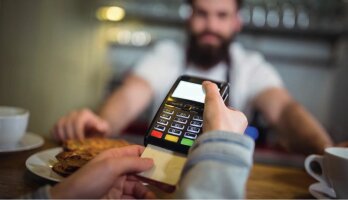We are surrounded every day by things that we know, that we can use and also with things that are new to us and that bring about change. We all react diff erently to change: for someof us, it brings joy, others don’t wish to accept it and it takes a while for them to get used to it. Smart cities, smart devices, smart projects, smart things are mostly bearers of change which most of us should not have related with the fact that we will have to get used to them somehow. Only a couple of passionate enthusiasts or complainers will head to a public offi ce or to the post offi ce gladly. But you can’t say the same about sites where business is happening. Each of us has our favorite shop, café or restaurant, where we have learned to use tools or perhaps rather objects for easier shopping and related payment. Each of us has a mobile phone or a contactless payment card (whether it’s a traditional plastic one, a payment sticker or a bracelet, watch or ring…).
: Why is there such a big diff erence between customer
experience in provision of services in the commercial and
private spheres?
We have a number of smart objects that simplify our daily lives: at home, at work, when traveling. It’s interesting to think about what we do and what we need. Very few of us leave the house to hunt and gather something to eat. When traveling to nature
(the outdoors), we likely don’t appreciate much technological gadgets. But we do have to get there somehow and we will likely use necessary services along the way. In today’s world, this means we will eat and drink, and also do some shopping.
: Why don’t we take advantage of what WE KNOW and
what we have on us every day?
Those of us who buy needed goods in stores and pay for them have strongly engrained purchasing behaviors. Merchants and banks have invested a lot of money to teach them to us. Why not use this in the state administration or in institutions or businesses that are connected to the government? Simple, quick purchases and payments determine our satisfaction.
In just a few short years, mobile phones and contactless payment cards have become “smart” objects that each of us own and use every day. A payment terminal is something that each of uses seve- ral times a day, but we don’t think about what it costs the merchant or how it works: we just beep and go. Today, it’s common in stores
to collect cash back, top off credit for calls on our phones, etc. We can do all this at the cash register with all merchants: simply and easily. We are accustomed to paying at vending machines or shopping kiosks: all of this by interacting with a small display. Payment cards, whether bank-issued or non-bank cards, off er many benefits. Bank-issued cards (Mastercard, Visa, etc.) aff ord today even more benefi ts and are commonly used for payment or reservation of goods, for services, for parking fees, for tickets to events, for public transport fares, etc. Instead of typing in complicated codes
or sharing information, micropayments allow us to purchase something easily. Barriers have disappeared and Central Europeans have come very quickly to like this type of payment. You just need the BEEP and everything is sorted.
: What if we used these simple skills in other areas of
our everyday lives?
Imagine a restaurant where you use a small screen to order, along with your colleagues, a lunch from the weekly menu. Or you order a beer: small, of course…? After a short while, the waiter, ideally with a smile, brings you your order. You want to pay? So you and your colleagues simply pick what you had, click on it, let the card beep and then leave. I think that not only you, but the waiter as well, will be glad. No one really likes the phrase “Could you split the bill for us?”
Or what happens whenI visit a bank branch and, at the door, there is a terminal similar to the one in the restaurant. I just click that I want to visit the cashier’s window and I get a ticket. I think that banks and other operations can save a lot of money using dedicated check-in systems.
What if I go to an exhibition and all I have to do is reserve a ticket and select card payment. On site, I don’t do a thing. I just show up with my card, press it to the terminal, let it beep and the tourniquet lets me in.
And what happens when this world we dream about, one without unnecessary bureaucracy where I as a citizen don’t have to shake my head and say “good grief, if I can do this as the bakery, why can’t I do it at the public office...” becomes reality?

